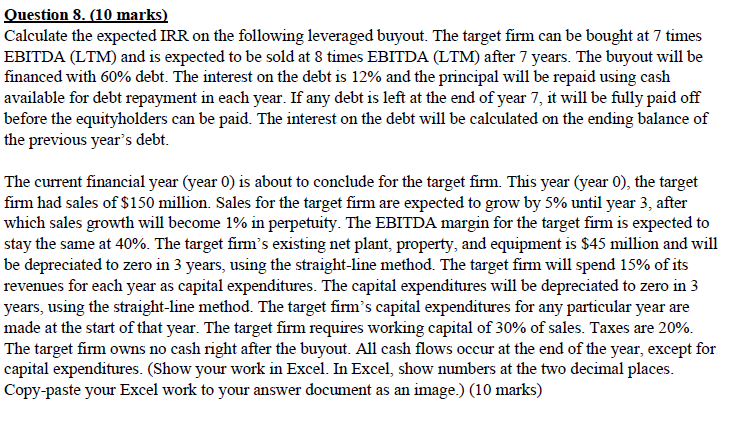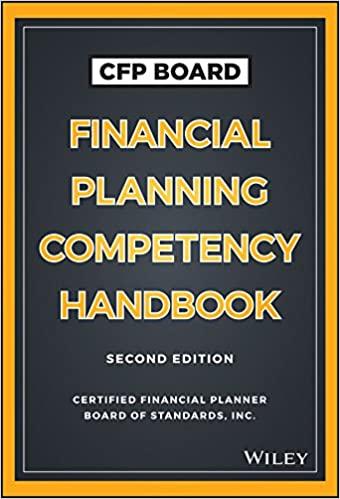PLEASE SOLVE IT IN 30 MINUTES DON'T TAKE LONG PLEASE THANKS !

Question 8. (10 marks) Calculate the expected IRR on the following leveraged buyout. The target firm can be bought at 7 times EBITDA (LTM) and is expected to be sold at 8 times EBITDA (LTM) after 7 years. The buyout will be financed with 60% debt. The interest on the debt is 12% and the principal will be repaid using cash available for debt repayment in each year. If any debt is left at the end of year 7, it will be fully paid off before the equityholders can be paid. The interest on the debt will be calculated on the ending balance of the previous year's debt. The current financial year (year 0 ) is about to conclude for the target firm. This year (year 0 ), the target firm had sales of $150 million. Sales for the target firm are expected to grow by 5% until year 3 , after which sales growth will become 1% in perpetuity. The EBITDA margin for the target firm is expected to stay the same at 40%. The target firm's existing net plant, property, and equipment is $45 million and will be depreciated to zero in 3 years, using the straight-line method. The target firm will spend 15% of its revenues for each year as capital expenditures. The capital expenditures will be depreciated to zero in 3 years, using the straight-line method. The target firm's capital expenditures for any particular year are made at the start of that year. The target firm requires working capital of 30% of sales. Taxes are 20%. The target firm owns no cash right after the buyout. All cash flows occur at the end of the year, except for capital expenditures. (Show your work in Excel. In Excel, show numbers at the two decimal places. Copy-paste your Excel work to your answer document as an image.) (10 marks) Question 8. (10 marks) Calculate the expected IRR on the following leveraged buyout. The target firm can be bought at 7 times EBITDA (LTM) and is expected to be sold at 8 times EBITDA (LTM) after 7 years. The buyout will be financed with 60% debt. The interest on the debt is 12% and the principal will be repaid using cash available for debt repayment in each year. If any debt is left at the end of year 7, it will be fully paid off before the equityholders can be paid. The interest on the debt will be calculated on the ending balance of the previous year's debt. The current financial year (year 0 ) is about to conclude for the target firm. This year (year 0 ), the target firm had sales of $150 million. Sales for the target firm are expected to grow by 5% until year 3 , after which sales growth will become 1% in perpetuity. The EBITDA margin for the target firm is expected to stay the same at 40%. The target firm's existing net plant, property, and equipment is $45 million and will be depreciated to zero in 3 years, using the straight-line method. The target firm will spend 15% of its revenues for each year as capital expenditures. The capital expenditures will be depreciated to zero in 3 years, using the straight-line method. The target firm's capital expenditures for any particular year are made at the start of that year. The target firm requires working capital of 30% of sales. Taxes are 20%. The target firm owns no cash right after the buyout. All cash flows occur at the end of the year, except for capital expenditures. (Show your work in Excel. In Excel, show numbers at the two decimal places. Copy-paste your Excel work to your answer document as an image.) (10 marks)







